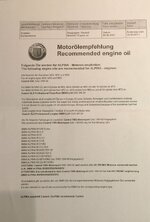markeg said:
Hmm. Appears they've changed their tune - when I asked, I was told that whilst it had always been Sytner's policy to recommend 10w60 for high mileage roadsters, when the document came out they said that they were now recommending it for all roadster engines in line with Alpina's recommendations and not just high mileage/excessive consumption ones. I had questioned which oil was best after a discussion with Ade, then with the Sytner's service lead, after I had already switched to 10w60 on their recommendation.
Having said that, I don't think I would switch back. I've had no issues with excessive consumption, engine performs as well as it always has, and have not seen any difference in mpg.
Annoying when two people ask the same question and get different answers

although it's possible that the person I spoke to was quoting the old line on oil. I think it's the 'We recommend also...' line that causes the confusion as it implies that 10w60 is an alternative oil for the cars in the list, if it read 'For the following cars we recommend...' then there'd be no confusion - I know you speak German so is it less ambiguous in the German text?
I had a similar discussion with Ade and his opinion was that 10w60 was a bit thick for the oil pathways in the B3s engine hence why, because of his high oil consumption issues, he had discussions with people who really 'know their oil' and settled on something around 5w40 (IIRC it was a mix of a couple of grades) as a good compromise.
#320's tucked away for the winter now but once I'm back from holiday I think I'll send an email to Axel Rimpler to see if he can clarify Alpina's recommendation.

